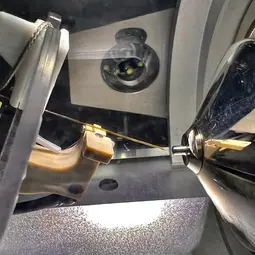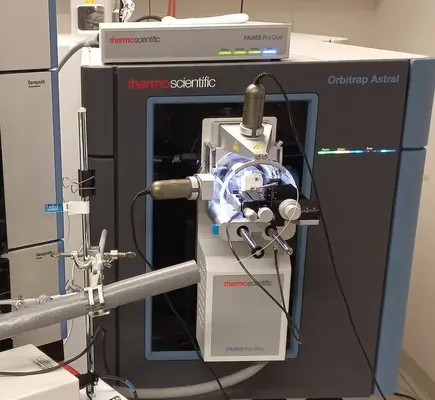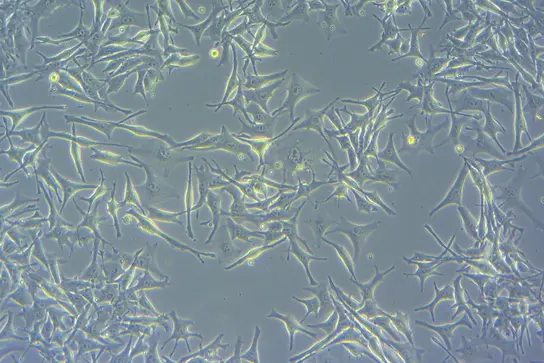Proteomics of Stem Cells and Cancer
- Functional and Structural Genomics

Prof. Dr. Jeroen Krijgsveld
Group leader
The proteome consists of thousands of proteins that collectively regulate cellular processes in health and disease. We investigate how proteome composition is dynamically regulated to understand cancer development and drug treatment - from patient tissues down to single cells.

Our Research

Proteins are often referred to as the workhorses of the cell, to indicate that they carry out the biochemical processes that give cells their identity and that endow them with specialized functions. Protein expression in every cell is tightly regulated, however this can become disbalanced by environmental factors or genetic mutations, leading to disease, including cancer. In our research we aim to gain insight into proteome regulation to understand the cellular processes that drive cancer development, and that regulate response to drug treatment.
Our research uses mass spectrometry as a powerful technology for detailed proteome characterisation to gain insight into cancer regulatory pathways in cells and tissues. In combination with biochemical and computational methods, we are developing dedicated approaches to understand the regulatory layers in the proteome, with a particular focus on secreted proteins, chromatin- and RNA-associated proteins. In addition, we have developed methods to specifically analyse protein synthesis and degradation to investigate the wiring of signalling networks and cellular response to treatment. We also have a strong focus on miniaturisation and automation to make proteomics a more sensitive and robust technology for both clinical and low-input applications, including single cells.
Research topics
Protein expression profiling for cancer proteomics
We use state-of-the-art mass spectrometry for deep and quantitative proteome profiling of clinical samples. To do this in a standardized manner, we have developed SP3 for automated sample preparation that seamlessly integrates with mass spectrometry, allowing us to analyze a variety of sample types (including cells, plasma, fresh-frozen and FFPE tissue) in high throughput. In collaboration with clinical partners, we apply this to understand tumor relapse in various cancer entities, with the aim to identify markers for treatment response that can inform clinical decisions for better patient care.
Cancer signaling and protein networks
Cancer cells shape their proteome as a consequence of genetic mutations or exposure to growth factors, with profound implications for disease progression. To understand the impact of such events at the proteome level, we have developed a nascent proteomics approach that combines pulsed-SILAC labeling, click-chemistry and mass spectrometry. This allows us to capture the proteins that are synthesized (or degraded) as an immediate response to a perturbation, which can be similarly applied to intracellular proteomes and secretomes. Our current research uses this approach to identify downstream effectors of cancer drugs and oncogenic mutations, to characterize the composition and crosstalk of the pathways they regulate, and to determine drug mechanism of action. The long-term aim is to identify proteins in these networks that can serve as drug targets for cancer treatment.
Protein interaction networks with RNA and chromatin
Proteins interact abundantly with RNA to regulate its translation and stability, and with DNA to regulate transcription in chromatin. Given this role of proteins at the core of cellular regulation, we have developed methods to characterize these networks and to investigate how they are remodeled during stress (e.g. DNA damage) or drug treatment. This includes approaches to identify proteins that co-localize with a chromatin-associated protein of interest (ChIP-SICAP), or to globally characterize protein composition of chromatin. We use this in our current research in the context of cell signaling, to identify mechanisms in chromatin that relay upstream signaling events to a downstream proteomic response.

Single-cell proteomics
Increased sensitivity of modern mass spectrometers and efficiency of sample preparation open up new perspectives for proteome analysis at the single cell level, however many technical challenges are still to be resolved. We actively investigate novel sample handling methods to minimize sample loss and enhance throughput, and we have implemented experimental and computational approaches to enhance proteome coverage and data completeness. We aim to further improve this technology and apply it to understand cellular heterogeneity and plasticity in cancer biology.
Our Team
The members of our team have complementary backgrounds in (analytical) chemistry, molecular biology, biochemistry, and clinical research. What brings us together is a fascination for mass spectrometry and its many applications to understand the complexity and dynamics of the proteome. What motivates us is to gain insight how the proteome regulates disease processes in cancer, and to discover novel targets for cancer treatment.
-

Prof. Dr. Jeroen Krijgsveld
Group leader
-

Dr. Syed Azmal Ali
Team leader
-

Karim Aljakouch
Postdoc
-

Katharina Bölz
MSc student
-

Alexandra Delipetrou
Technician
-

Gesa Durniock-Thierschmann
Administrative assistant
-

Karl Krull
Postdoc
-

Roman Ladig
Project manager
-

Elena Markeviciute
PhD student
-

Martin Otterbein
Data scientist
-

Anastasiia Sergeeva
PhD student
-

Sara Signoretti
Visiting PhD student
-
Yuvashree Sivanandham
MSc student
-

Selin Ulukaya
PhD student
- Show profile

Adrian-Daniel Vasiu
PhD student
- Show profile

Qianying Yang
PhD student
Publications
Cell Chem Biol. 2025.
Degradome analysis to identify direct protein substrates of small-molecule degraders.
Jochem M, Schrempf A, Wagner LM, Segal D, Cisneros J, Ng A, Winter GE, Krijgsveld J.
Mol Cell Proteomics. 2025.
Wang H, Syed AA, Krijgsveld J, Sigismondo G.
Nat Commun. 2025.
Arseni L, Sigismondo G, Yazdanparast H, Hermansen JU, Mack N, Ohl S, Kalter V, Iskar M, Kalxdorf M, Friedel D, Rettel M, Paul Y, Ringshausen I, Eldering E, Dubois J, Kater AP, Zapatka M, Roessner PM, Tausch E, Stilgenbauer S, Dietrich S, Savitski MM, Skånland SS, Krijgsveld J, Lichter P, Seiffert M.
Nat Cell Biol. 2025.
RNA-binding proteins mediate the maturation of chromatin topology during differentiation.
Dehingia B, Milewska-Puchała M, Janowski M, Rafiee MR, Abbas M, Piotrowska A, Senge J, Blaut P, Walsh D, Severino J, Chaudhury D, Iqbal S, Montiel-Manriquez R, Jankowska S, Zare P, Huber W, Xu J, Casellas R, Zimmermann T, Dłotko P, Krijgsveld J, Pękowska A.
J Proteome Res. 2025.
Multicenter longitudinal quality assessment of MS-based proteomics in plasma and serum.
Kardell O, Gronauer T, von Toerne C, Merl-Pham J, König AC, Barth TK, Mergner J, Ludwig C, Tüshaus J, Giesbertz P, Breimann S, Schweizer L, Müller T, Kliewer G, Distler U, Gomez-Zepeda D, Popp O, Qin D, Teupser D, Cox J, Imhof A, Küster B, Lichtenthaler SF, Krijgsveld J, Tenzer S, Mertins P, Coscia F, Hauck SM.
Cancer Commun. 2025.
Geyer FH, Ritter A, Kinn-Gurzo S, Faehling T, Li J, Jarosch A, Ngo C, Vinca E, Aljakouch K, Orynbek A, Ohmura S, Kirchner T, Imle R, Romero-Pérez L, Díaz-Martín J, Bertram S, de Álava E, Henon C, Postel-Vilnay S, Banito A, Sill M, Versleijen-Jonkers Y, Mayer BFB, Ebinger M, Sparber-Sauer M, Stegmaier S, Baumhoer D, Hartmann W, Krijgsveld J, Horst D, Delattre O, Grohar PJ, Grünewald TGP, Cidre-Aranaz F.
Nat Commun. 2025.
mTORC1 cooperates with tRNA wobble modification to sustain the protein synthesis machinery.
Hermann J, Borteçen T, Kalis R, Kowar A, Pechincha C, Vogt V, Schneider M, Helm D, Krijgsveld J, Loayza-Puch F, Zuber J, Palm W.
J Med. Virol. 2025.
Pleiotropic Effects of Metformin on the Chemotherapy Response of HPV-Positive Cancer Cells.
Avenhaus A, Kuhn BJ, Velimirović M, Strobel TD, Bulkescher J, Lohrey C, Krijgsveld J, Hoppe-Seyler F, Hoppe-Seyler K.
Blood 2025.
Pauli C, Kienhöfer M, Blank MF, Begik O, Rohde C, Zimmermann SM, Werner L, Heid D, Xu F, Weidenauer K, Delaunay S, Krall N, Trunk K, Zhao D, Zhou F, Llovera L, Alexane O, Heit-Mondrzyk A, Platzbecker U, Baldus CD, Serve H, Bornhäuser M, Vågbø CB, Benitah SA, Krijgsveld J, Novoa EM, Müller-Tidow C, Frye M.
Cell Rep Med. 2025.
Combined MEK and PARP inhibition enhances radiation response in rectal cancer.
Xiao Q, Riedesser JE, Mulholland T, Li Z, Buchloh J, Albrecht P, Yang X, Li M, Venkatachalam N, Skabkina O, Klupsch A, Eichhorn E, Wang L, Belle S, Schulte N, Schmitz D, Froelich MF, Trikhirhisthit K, Valentini E, Boonekamp KE, Petersen Y, Miersch T, Burgermeister E, Herskind C, Veldwijk MR, Brochhausen C, Ihnatko R, Krijgsveld J, Kurth I, Zhu Y, Ma Y, Cao K, Boutros M, Ebert MP, Zhan T, Betge J.
Nat Commun. 2025.
Distler U, Yoo HB, Kardell O, Hein D, Sielaff M, Scherer M, Jozefowicz AM, Leps C, Gomez-Zepeda D, von Toerne C, Merl-Pham J, Barth TK, Tüshaus J, Giesbertz P, Müller T, Kliewer G, Aljakouch K, Helm B, Unger H, Frey DL, Helm D, Schwarzmüller L, Popp O, Qin D, Wudy SI, Sinn LR, Mergner J, Ludwig C, Imhof A, Kuster B, Lichtenthaler SF, Krijgsveld J, Klingmüller U, Mertins P, Coscia F, Ralser M, Mülleder M, Hauck SM, Tenzer S.
J Clin Invest. 2025.
High 4E-BP-1 expression associates with chromosome 8 gain and CDK4/6 sensitivity in Ewing Sarcoma.
Funk CM, Ehlers AC, Orth MF, Aljakouch K, Li J, Hoelting TL, Will R, Geyer FH, Ceranski AK, Willis F, Vinca E, Ohmura S, Imle R, Siebenlist J, Yershova A, Knott MM, Zahnow F, Sastre A, Alonso J, Sahm F, Peterziel H, Loboda A, Schneider M, Banito A, Leprivier G, Hartmann W, Dirksen U, Witt O, Oehme I, Pfister SM, Romero-Pérez L, Krijgsveld J, Cidre-Aranaz F, Grünewald TG, Musa J.
Nat Commun. 2024.
Krull KK, Ali SA, Krijgsveld J.
Mol Cell Proteomics. 2024.
Secretome Analysis: Reading Cellular Sign Language to Understand Intercellular Communication.
Wu W, Krijgsveld J.
Clin Proteomics. 2024.
A single-sample workflow for joint metabolomic and proteomic analysis of clinical specimens.
Gegner HM, Naake T, Aljakouch K, Dugourd A, Kliewer G, Müller T, Schilling D, Schneider MA, Kunze-Rohrbach N, Grünewald TGP, Hell R, Saez-Rodriguez J, Huber W, Poschet G, Krijgsveld J.
J Extracell Biol. 2024.
Lipid droplets and small extracellular vesicles: More than two independent entities.
Genard GC, Tirinato L, Pagliari F, Da Silva J, Giammona A, Alquraish F, Reyes MP, Bordas M, Marafioti MG, Franco SD, Janssen J, Garcia-Calderón D, Hanley R, Nistico C, Fukasawa Y, Müller T, Krijgsveld J, Todaro M, Costanzo FS, Stassi G, Nessling M, Richter K, Maass KK, Liberale C, Seco J.
Nat Commun. 2024.
Jiang X, Baig AH, Palazzo G, Del Pizzo R, Bortecen T, Groessl S, Zaal EA, Amaya Ramirez CC, Kowar A, Aviles-Huerta D, Berkers CR, Palm W, Tschaharganeh D, Krijgsveld J, Loayza-Puch F.
Genome Res. 2024.
DEAD box RNA helicases are pervasive protein kinase interactors and activators.
Hirth A, Fatti E, Netz E, Acebron SP, Papageorgiou D, Švorinić A, Cruciat CM, Karaulanov E, Gopanenko A, Zhu T, Sinning I, Krijgsveld J, Kohlbacher O, Niehrs C.
Int J Biol Macromol. 2024.
Bellone ML, Syed AA, Vitale RM, Sigismondo G, Mensitieri F, Pollastro F, Amodeo P, Appendino G, De Tommasi N, Krijgsveld J, Dal Piaz F.
Nucleic Acids Res. 2024.
Bakr A, Della Corte G, Veselinov O, Kelekçi S, Chen MM, Lin YY, Sigismondo G, Iacovone M, Cross A, Syed R, Jeong Y, Sollier E, Liu CS, Lutsik P, Krijgsveld J, Weichenhan D, Plass C, Popanda O, Schmezer P.
Int J Cancer. 2024.
Mancarella D, Ellinghaus H, Sigismondo G, Veselinov O, Kühn A, Goyal A, Hartmann M, Fellenberg J, Krijgsveld J, Plass C, Popanda O, Schmezer P, Bakr A.
Nat Commun. 2023.
An integrated workflow for quantitative analysis of the newly synthesized proteome.
Borteçen T, Müller T, Krijgsveld J.
Nucleic Acids Res. 2023.
Multi-layered chromatin proteomics identifies cell vulnerabilities in DNA repair.
Sigismondo G, Arseni L, Palacio-Escat N, Hofmann TG, Seiffert M, Krijgsveld J.
Methods Mol Biol. 2023.
Automated Sample Preparation for Mass Spectrometry-Based Clinical Proteomics.
Müller T, Cremonini MA, Kliewer G, Krijgsveld J.
Nucleic Acids Res. 2023.
Trendel J, Boileau E, Jochem M, Dieterich C, Krijgsveld J.
J Med Virol. 2023.
The impact of cycling hypoxia on the phenotype of HPV-positive cervical cancer cells.
Heber N, Kuhn BJ, Strobel TD, Lohrey C, Krijgsveld J, Hoppe-Seyler K, Hoppe-Seyler F.
Nat Commun. 2023.
Goyal A, Bauer J, Hey J, Papageorgiou DN, Stepanova E, Daskalakis M, Scheid J, Dubbelaar M, Klimovich B, Schwarz D, Märklin M, Roerden M, Lin YY, Ma T, Mücke O, Rammensee HG, Lübbert M, Loayza-Puch F, Krijgsveld J, Walz JS, Plass C.
Leukemia. 2023.
Weidenauer K, Schmidt C, Rohde C, Pauli C, Blank MF, Heid D, Waclawiczek A, Corbacioglu A, Göllner S, Lotze M, Vierbaum L, Renders S, Krijgsveld J, Raffel S, Sauer T, Trumpp A, Pabst C, Müller-Tidow C, Janssen M.
J Med Virol. 2023.
Schäfer M, Schneider M, Müller T, Franz N, Braspenning-Wesch I, Stephan S, Schmidt G, Krijgsveld J, Helm D, Rösl F, Hasche D.
Sci Signal. 2023.
DEAD box RNA helicases act as nucleotide exchange factors for casein kinase 2.
Fatti E, Hirth A, Švorinić A, Günther M, Stier G, Cruciat CM, Acebrón SP, Papageorgiou D, Sinning I, Krijgsveld J, Höfer T, Niehrs C.
Cell Rep. 2023.
BCAT1 redox function maintains mitotic fidelity.
Francois L, Boskovic P, Knerr J, He W, Sigismondo G, Schwan C, More TH, Schlotter M, Conway ME, Krijgsveld J, Hiller K, Grosse R, Lichter P, Radlwimmer B.
Mol Psychiatry. 2023.
Weigel B, Tegethoff JF, Grieder SD, Lim B, Nagarajan B, Liu YC, Truberg J, Papageorgiou D, Adrian-Segarra JM, Schmidt LK, Kaspar J, Poisel E, Heinzelmann E, Saraswat M, Christ M, Arnold C, Ibarra IL, Campos J, Krijgsveld J, Monyer H, Zaugg JB, Acuna C, Mall M.
Cancer Discov. 2023.
A Dynamic rRNA Ribomethylome Drives Stemness in Acute Myeloid Leukemia.
Zhou F, Aroua N, Liu Y, Rohde C, Cheng J, Wirth AK, Fijalkowska D, Göllner S, Lotze M, Yun H, Yu X, Pabst C, Sauer T, Oellerich T, Serve H, Röllig C, Bornhäuser M, Thiede C, Baldus C, Frye M, Raffel S, Krijgsveld J, Jeremias I, Beckmann R, Trumpp A, Müller-Tidow C.
Front Mol Biosci. 2022.
Pre-analytical processing of plasma and serum samples for combined proteome and metabolome analysis.
Gegner HM, Naake T, Dugourd A, Müller T, Czernilofsky F, Kliewer G, Jäger E, Helm B, Kunze-Rohrbach N, Klingmüller U, Hopf C, Müller-Tidow C, Dietrich S, Saez-Rodriguez J, Huber W, Hell R, Poschet G, Krijgsveld J.
Proteomics. 2022.
Cracking chromatin with proteomics: From chromatome to histone modifications.
Sigismondo G, Papageorgiou DN, Krijgsveld J.
Cell Death Discov. 2022.
Vit G, Hirth A, Neugebauer N, Kraft BN, Sigismondo G, Cazzola A, Tessmer C, Duro J, Krijgsveld J, Hofmann I, Berger M, Klüter H, Niehrs C, Nilsson J, Krämer A.
Cell Rep. 2022.
BCAT1 redox function maintains mitotic fidelity.
Francois L, Boskovic P, Knerr J, He W, Sigismondo G, Schwan C, More TH, Schlotter M, Conway ME, Krijgsveld J, Hiller K, Grosse R, Lichter P, Radlwimmer B.
Leukemia. 2022.
Allert C, Waclawiczek A, Zimmermann SMN, Göllner S, Heid D, Janssen M, Renders S, Rohde C, Bauer M, Bruckmann M, Zinz R, Pauli C, Besenbeck B, Wickenhauser C, Trumpp A, Krijgsveld J, Müller-Tidow C, Blank MF.
Blood. 2022.
Janssen M, Schmidt C, Bruch PM, Blank MF, Rohde C, Waclawiczek A, Heid D, Renders S, Göllner S, Vierbaum L, Besenbeck B, Herbst SA, Knoll M, Kolb C, Przybylla A, Weidenauer K, Ludwig AK, Fabre M, Gu M, Schlenk RF, Stölzel F, Bornhäuser M, Röllig C, Platzbecker U, Baldus C, Serve H, Sauer T, Raffel S, Pabst C, Vassiliou G, Vick B, Jeremias I, Trumpp A, Krijgsveld J, Müller-Tidow C, Dietrich S.
Bone Res. 2022.
Meirow Y, Jovanovic M, Zur Y, Habib J, Colombo DF, Twaik N, Ashkenazi-Preiser H, Ben-Meir K, Mikula I Jr, Reuven O, Kariv G, Daniel L, Baraghithy S, Klein Y, Krijgsveld J, Levaot N, Baniyash M.
RNA Biol. 2022.
Preferential translation of p53 target genes.
Hisaoka M, Schott J, Bortecen T, Lindner D, Krijgsveld J, Stoecklin G.
Nat Commun. 2021.
IceR improves proteome coverage and data completeness in global and single-cell proteomics.
Kalxdorf M, Müller T, Stegle O, Krijgsveld J.
Methods Mol Biol. 2021.
Using ChIP-SICAP to Identify Proteins That Co-localize in Chromatin.
Rafiee MR, Krijgsveld J.
RNA Biol. 2022.
Preferential translation of p53 target genes.
Hisaoka M, Schott J, Bortecen T, Lindner D, Krijgsveld J, Stoecklin G.
Nucleic Acids Res. 2021.
Bakr A, Hey J, Sigismondo G, Liu CS, Sadik A, Goyal A, Cross A, Iyer RL, Müller P, Trauernicht M, Breuer K, Lutsik P, Opitz CA, Krijgsveld J, Weichenhan D, Plass C, Popanda O, Schmezer P.
Cancers (Basel). 2021.
Herrmann AL, Kuhn BJ, Holzer A, Krijgsveld J, Hoppe-Seyler K, Hoppe-Seyler F.
Sci Transl Med. 2021.
Temporal multi-omics identifies LRG1 as a vascular niche instructor of metastasis.
Singhal M, Gengenbacher N, Abdul Pari AA, Kamiyama M, Hai L, Kuhn BJ, Kallenberg DM, Kulkarni SR, Camilli C, Preuß SF, Leuchs B, Mogler C, Espinet E, Besemfelder E, Heide D, Heikenwalder M, Sprick MR, Trumpp A, Krijgsveld J, Schlesner M, Hu J, Moss SE, Greenwood J, Augustin HG.
J Cachexia Sarcopenia Muscle. 2021.
Morigny P, Kaltenecker D, Zuber J, Machado J, Mehr L, Tsokanos FF, Kuzi H, Hermann CD, Voelkl M, Monogarov G, Springfeld C, Laurent V, Engelmann B, Friess H, Zörnig I, Krüger A, Krijgsveld J, Prokopchuk O, Fisker Schmidt S, Rohm M, Herzig S, Berriel Diaz M.
Oncogene. 2021.
Launonen KM, Paakinaho V, Sigismondo G, Malinen M, Sironen R, Hartikainen JM, Laakso H, Visakorpi T, Krijgsveld J, Niskanen EA, Palvimo JJ.
Cancers (Basel). 2021.
Strzeszewska-Potyrała A, Staniak K, Czarnecka-Herok J, Rafiee MR, Herok M, Mosieniak G, Krijgsveld J, Sikora E.
Leukemia. 2021.
Kiehlmeier S, Rafiee MR, Bakr A, Mika J, Kruse S, Müller J, Schweiggert S, Herrmann C, Sigismondo G, Schmezer P, Krijgsveld J, Gröschel S.
Int J Cancer. 2021.
Effects of Metformin on the virus/host cell crosstalk in human papillomavirus-positive cancer cells.
Hoppe-Seyler K, Herrmann AL, Däschle A, Kuhn BJ, Strobel TD, Lohrey C, Bulkescher J, Krijgsveld J, Hoppe-Seyler F.
Cancers (Basel). 2021.
Functional States in Tumor-Initiating Cell Differentiation in Human Colorectal Cancer.
Zowada MK, Tirier SM, Dieter SM, Krieger TG, Oberlack A, Chua RL, Huerta M, Ten FW, Laaber K, Park J, Jechow K, Müller T, Kalxdorf M, Kriegsmann M, Kriegsmann K, Herbst F, Krijgsveld J, Schneider M, Eils R, Glimm H, Conrad C, Ball CR.
Nucleic Acids Res. 2021.
Paakinaho V, Lempiäinen JK, Sigismondo G, Niskanen EA, Malinen M, Jääskeläinen T, Varjosalo M, Krijgsveld J, Palvimo JJ.
J Mol Cell Cardiol. 2021.
Updated and enhanced pig cardiac transcriptome based on long-read RNA sequencing and proteomics.
Müller T, Boileau E, Talyan S, Kehr D, Varadi K, Busch M, Most P, Krijgsveld J, Dieterich C.
Neuro Oncol. 2021.
Ecker J, Thatikonda V, Sigismondo G, Selt F, Valinciute G, Oehme I, Müller C, Buhl JL, Ridinger J, Usta D, Qin N, van Tilburg CM, Herold-Mende C, Remke M, Sahm F, Westermann F, Kool M, Wechsler-Reya RJ, Chavez L, Krijgsveld J, Jäger N, Pfister SM, Witt O, Milde T.
Cell Mol Life Sci. 2021.
The quest of cell surface markers for stem cell therapy.
Meyfour A, Pahlavan S, Mirzaei M, Krijgsveld J, Baharvand H, Salekdeh GH.
Mol Syst Biol. 2020.
Automated sample preparation with SP3 for low-input clinical proteomics.
Müller T, Kalxdorf M, Longuespée R, Kazdal DN, Stenzinger A, Krijgsveld J.
Cell Syst. 2020.
Bunina D, Abazova N, Diaz N, Noh KM, Krijgsveld J, Zaugg JB.
Nat Microbiol. 2020.
Selkrig J, Li N, Hausmann A, Mangan MSJ, Zietek M, Mateus A, Bobonis J, Sueki A, Imamura H, El Debs B, Sigismondo G, Florea BI, Overkleeft HS, Kopitar-Jerala N, Turk B, Beltrao P, Savitski MM, Latz E, Hardt WD, Krijgsveld J, Typas A.
Mol Syst Biol. 2020.
Protease-resistant streptavidin for interaction proteomics.
Rafiee MR, Sigismondo G, Kalxdorf M, Förster L, Brügger B, Béthune J, Krijgsveld J.
J Mol Cell Cardiol. 2021.
Updated and enhanced pig cardiac transcriptome based on long-read RNA sequencing and proteomics.
Müller T, Boileau E, Talyan S, Kehr D, Varadi K, Busch M, Most P, Krijgsveld J, Dieterich C.
Cell Mol Life Sci. 2021.
The quest of cell surface markers for stem cell therapy.
Meyfour A, Pahlavan S, Mirzaei M, Krijgsveld J, Baharvand H, Salekdeh GH.
Blood. 2020.
Quantitative proteomics reveals specific metabolic features of acute myeloid leukemia stem cells.
Raffel S, Klimmeck D, Falcone M, Demir A, Pouya A, Zeisberger P, Lutz C, Tinelli M, Bischel O, Bullinger L, Thiede C, Flörcken A, Westermann J, Ehninger G, Ho AD, Müller-Tidow C, Gu Z, Herrmann C, Krijgsveld J, Trumpp A, Hansson J.
iScience. 2020.
Delacher M, Barra MM, Herzig Y, Eichelbaum K, Rafiee MR, Richards DM, Träger U, Hofer AC, Kazakov A, Braband KL, Gonzalez M, Wöhrl L, Schambeck K, Imbusch CD, Abramson J, Krijgsveld J, Feuerer M.
Mol Metab. 2020.
Schäfer M, Oeing CU, Rohm M, Baysal-Temel E, Lehmann LH, Bauer R, Volz HC, Boutros M, Sohn D, Sticht C, Gretz N, Eichelbaum K, Werner T, Hirt MN, Eschenhagen T, Müller-Decker K, Strobel O, Hackert T, Krijgsveld J, Katus HA, Berriel Diaz M, Backs J, Herzig S.
Nat Commun. 2020.
Carnesecchi J, Sigismondo G, Domsch K, Baader CEP, Rafiee MR, Krijgsveld J, Lohmann I.
Curr Opin Chem Biol. 2020.
Organic phase separation opens up new opportunities to interrogate the RNA-binding proteome.
Smith T, Villanueva E, Queiroz RML, Dawson CS, Elzek M, Urdaneta EC, Willis AE, Beckmann BM, Krijgsveld J, Lilley KS.
Circulation. 2020.
Kuhn TC, Knobel J, Burkert-Rettenmaier S, Li X, Meyer IS, Jungmann A, Sicklinger F, Backs J, Lasitschka F, Müller OJ, Katus HA, Krijgsveld J, Leuschner F.
Blood. 2020.
Pauli C, Liu Y, Rohde C, Cui C, Fijalkowska D, Gerloff D, Walter C, Krijgsveld J, Dugas M, Edemir B, Pabst C, Müller LP, Zhou F, Müller-Tidow C.
Immunity. 2020.
Plum T, Wang X, Rettel M, Krijgsveld J, Feyerabend TB, Rodewald HR.
Cell. 2019.
The Human RNA-Binding Proteome and Its Dynamics during Translational Arrest.
Trendel J, Schwarzl T, Horos R, Prakash A, Bateman A, Hentze MW, Krijgsveld J.
Nat Protoc. 2019.
Single-pot, solid-phase-enhanced sample preparation for proteomics experiments.
Hughes CS, Moggridge S, Müller T, Sorensen PH, Morin GB, Krijgsveld J.
Mol Cell. 2019.
Cagnetta R, Wong HH, Frese CK, Mallucci GR, Krijgsveld J, Holt CE.
Cell Rep. 2019.
The RNA-Binding Protein YBX3 Controls Amino Acid Levels by Regulating SLC mRNA Abundance.
Cooke A, Schwarzl T, Huppertz I, Kramer G, Mantas P, Alleaume AM, Huber W, Krijgsveld J, Hentze MW.
Neuro Oncol. 2019.
Hübner JM, Müller T, Papageorgiou DN, Mauermann M, Krijgsveld J, Russell RB, Ellison DW, Pfister SM, Pajtler KW, Kool M.
Cell Oncol (Dordr). 2019.
Lamberti MJ, Rettel M, Krijgsveld J, Rivarola VA, Rumie Vittar NB.
mBio. 2019.
Bossler F, Kuhn BJ, Günther T, Kraemer SJ, Khalkar P, Adrian S, Lohrey C, Holzer A, Shimobayashi M, Dürst M, Mayer A, Rösl F, Grundhoff A, Krijgsveld J, Hoppe-Seyler K, Hoppe-Seyler F.
Mol Cell Proteomics. 2019.
Erich K, Reinle K, Müller T, Munteanu B, Sammour DA, Hinsenkamp I, Gutting T, Burgermeister E, Findeisen P, Ebert MP, Krijgsveld J, Hopf C.
Nature. 2018.
The SWI/SNF complex is a mechanoregulated inhibitor of YAP and TAZ.
Chang L, Azzolin L, Di Biagio D, Zanconato F, Battilana G, Lucon Xiccato R, Aragona M, Giulitti S, Panciera T, Gandin A, Sigismondo G, Krijgsveld J, Fassan M, Brusatin G, Cordenonsi M, Piccolo S.
Mol Cell Proteomics. 2019.
Erich K, Reinle K, Müller T, Munteanu B, Sammour DA, Hinsenkamp I, Gutting T, Burgermeister E, Findeisen P, Ebert MP, Krijgsveld J, Hopf C.
Nat Med. 2018.
Transcriptional addiction in cancer cells is mediated by YAP/TAZ through BRD4.
Zanconato F, Battilana G, Forcato M, Filippi L, Azzolin L, Manfrin A, Quaranta E, Di Biagio D, Sigismondo G, Guzzardo V, Lejeune P, Haendler B, Krijgsveld J, Fassan M, Bicciato S, Cordenonsi M, Piccolo S.
Mol Cell Proteomics. 2018.
Comparative Secretome Analyses of Primary Murine White and Brown Adipocytes Reveal Novel Adipokines.
Ali Khan A, Hansson J, Weber P, Foehr S, Krijgsveld J, Herzig S, Scheideler M.
Neuron. 2018.
Rapid Cue-Specific Remodeling of the Nascent Axonal Proteome.
Cagnetta R, Frese CK, Shigeoka T, Krijgsveld J, Holt CE.
Elife. 2018.
Dewari PS, Southgate B, Mccarten K, Monogarov G, O'Duibhir E, Quinn N, Tyrer A, Leitner MC, Plumb C, Kalantzaki M, Blin C, Finch R, Bressan RB, Morrison G, Jacobi AM, Behlke MA, von Kriegsheim A, Tomlinson S, Krijgsveld J, Pollard SM.
Mol Cell Proteomics. 2018.
Buczak K, Ori A, Kirkpatrick JM, Holzer K, Dauch D, Roessler S, Endris V, Lasitschka F, Parca L, Schmidt A, Zender L, Schirmacher P, Krijgsveld J, Singer S, Beck M.
Get in touch with us

